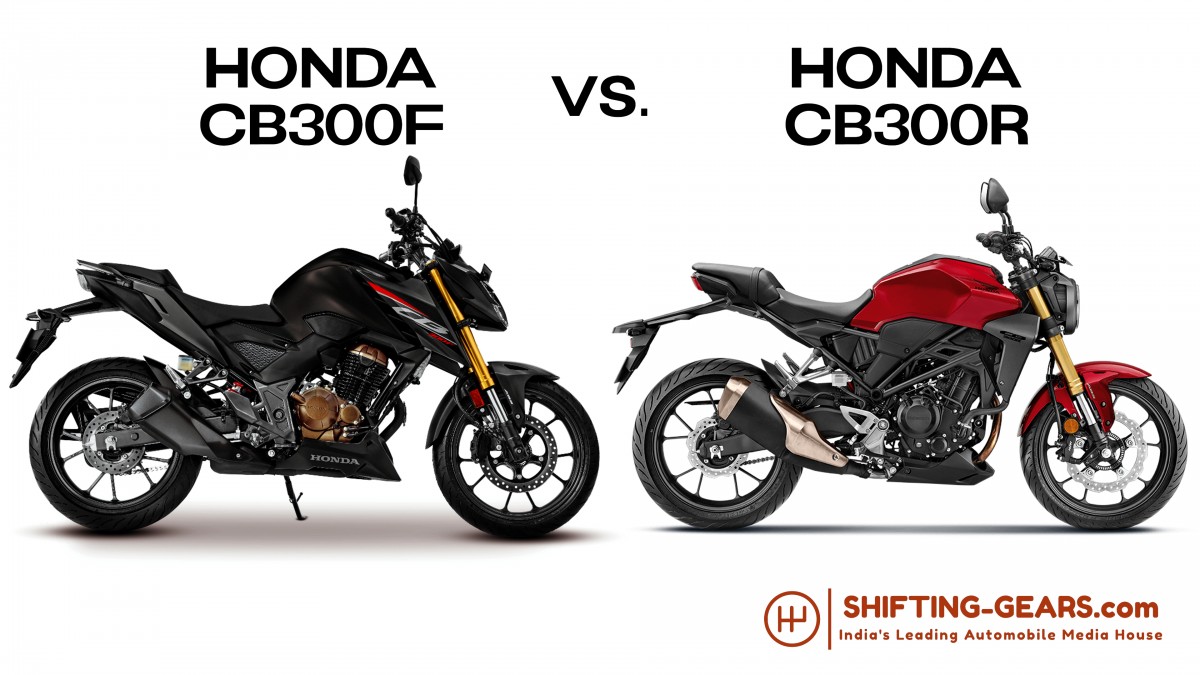

Honda recently introduced the CB300F in the market. The street naked fighter gets a host of new technologies and aims to compete with the other 300cc offerings in the market. However, one of the other 300cc street naked motorcycles is Honda’s own CB300R. Hence, in this specification comparison, we pin the two Honda street naked motorcycles so that you know which is the right one for you.
The newer of the two, CB300F, is available in two variants – DLX & DLX Pro. Prices for the Honda CB300F start at INR 2,25,900 ex-showroom for the DLX variant. Meanwhile, the DLX Pro variant comes with a sticker price of INR 2,28,900. The CB300F comes in 3 colour options – Sports Red, Mat Marvel Blue Metallic & Mat Axis Grey Metallic.
On the other hand, the Honda CB300R does not come in different variants. The CB300R comes with a sticker price of INR 2,77,000 ex-showroom. Thus, making it about half a lakh more expensive than the CB300F. Honda offers the CB300R in two colour options – Matte Steel Black & Pearl Spartan Red.
The CB300F uses a 293.52cc oil-cooled single-cylinder engine with a SOHC valvetrain. It makes 24 PS at 7,500 rpm and 25.6 Nm of torque at 5,500 rpm. The CB300F also uses a 6-speed gearbox with a slip and assist clutch. Although both share the ‘300’ in their names, both bikes have different engines.
Powering the CB300R is a 286.01cc liquid-cooled single-cylinder engine with a DOHC valvetrain. The CB300R makes 30.7 PS of power at 9,000 rpm and 27.5 Nm of torque at 7,500 rpm. Thus, it is 6.7 PS and 1.9 Nm more than the CB300F. But like the CB300F, the CB300R also uses a 6-speed gearbox with a slip and assist clutch.
Both the bikes use a diamond-type frame with upside-down forks at the front and a monoshock at the rear. Both also offer preload adjustability for the rear monoshock. However, while the CB300F offers 5-steps of adjustability, the CB300R offers 7-steps.
As for the brakes, both bikes use disc brakes at the front and rear. However, there are some differences. The CB300F uses a 276mm front disc and 220mm rear disc. At the same time, the CB300R uses a larger 296mm disc at the front, but the rear is the same size as the CB300F. Furthermore, the CB300R uses 4-piston radially-mounted callipers. Both bikes offer Dual-Channel ABS as standard. Additionally, the CB300R also gets an Inertial Measurement Unit (IMU).
As for tyre sizes, they are identical. Both use a 110-section front and 150-section rear tyre with 17-inch wheels.
The Honda CB300F measures 2,084mm in length, 765mm in width, 1,075mm in height and has a wheelbase of 1,390mm. It tips the scales at 153 kg and has a 14.1-litre fuel tank capacity. Meanwhile, the ground clearance and seat height stand at 177mm and 789mm, respectively.
On the other hand, except for the width, the CB300R is smaller in all aspects compared to the CB300F. It measures 2,017mm in length, 802mm in width, 1,047mm in height and has a wheelbase of 1,352mm. At 146 kg, it is also 7 kg lighter than the CB300F. However, its fuel tank capacity, at 9.7-litre, is much smaller than the CB300F. Meanwhile, ground clearance and seat height stand at 157mm and 801mm, respectively.
Also Read: 2022 Honda CB300F launched in India at INR 2.26 lakh